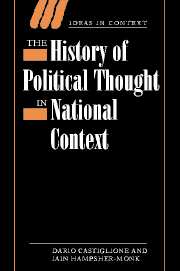Book contents
- Frontmatter
- Contents
- List of contributors
- Preface
- 1 Introduction The history of political thought and the national discourses of politics
- 2 The voice of the ‘Greeks’ in the conversation of mankind
- 3 History of political theory in the Federal Republic of Germany: strange death and slow recovery
- 4 A German version of the ‘linguistic turn’: Reinhart Koselleck and the history of political and social concepts (Begriffsgeschichte)
- 5 One hundred years of the history of political thought in Italy
- 6 Discordant voices: American histories of political thought
- 7 The professoriate of political thought in England since 1914: a tale of three chairs
- 8 The history of political thought and the political history of thought
- 9 The rise of, challenge to and prospects for a Collingwoodian approach to the history of political thought
- 10 Towards a philosophical history of the political
- 11 ‘Le retour des émigrés’? The study of the history of political ideas in contemporary France
- 12 National political cultures and regime changes in Eastern and Central Europe
- 13 The limits of the national paradigm in the study of political thought: the case of Karl Popper and Central European cosmopolitanism
- 14 Postscript. Disciplines, canons and publics: the history of ‘the history of political thought’ in comparative perspective
- Index
- IDEAS IN CONTEXT
1 - Introduction The history of political thought and the national discourses of politics
Published online by Cambridge University Press: 23 September 2009
- Frontmatter
- Contents
- List of contributors
- Preface
- 1 Introduction The history of political thought and the national discourses of politics
- 2 The voice of the ‘Greeks’ in the conversation of mankind
- 3 History of political theory in the Federal Republic of Germany: strange death and slow recovery
- 4 A German version of the ‘linguistic turn’: Reinhart Koselleck and the history of political and social concepts (Begriffsgeschichte)
- 5 One hundred years of the history of political thought in Italy
- 6 Discordant voices: American histories of political thought
- 7 The professoriate of political thought in England since 1914: a tale of three chairs
- 8 The history of political thought and the political history of thought
- 9 The rise of, challenge to and prospects for a Collingwoodian approach to the history of political thought
- 10 Towards a philosophical history of the political
- 11 ‘Le retour des émigrés’? The study of the history of political ideas in contemporary France
- 12 National political cultures and regime changes in Eastern and Central Europe
- 13 The limits of the national paradigm in the study of political thought: the case of Karl Popper and Central European cosmopolitanism
- 14 Postscript. Disciplines, canons and publics: the history of ‘the history of political thought’ in comparative perspective
- Index
- IDEAS IN CONTEXT
Summary
A number of studies over the past two decades have explored the national context of movements and ideas with a predominantly universalist character or aspiration. Although this has often meant a revision in our understanding of how such ideas and movements developed and of the impact they made, the approach chosen did not entirely go beyond the now widely accepted scholarly othodoxy of presenting ideas ‘in context’ – even if the identity of the appropriate context often remains a point of contestation.
The idea of this volume – of nationally contextualising the history of political thought – presents, however, a number of difficulties that were not germane to these other studies. This is so on account of the peculiar nature of the subject of our investigation, which can be understood both as an academic discipline, ‘the history of political thought’, but also in more substantive terms as a form of discourse, the history of ‘political thought’. Such an ambivalence is exemplified to the point of ambiguity in the chapters comprising the volume. As we collected, reflected and commented on the essays provided by our illustrious contributors, we realised in just how many directions this particular field can be ploughed. Hence rather than offering a state-of-the-art picture, the present volume opens up an array of problems for the location and study of the history of political thought. From such a perspective, the ‘national context’ approach functions to place in sharp relief the intricate web of issues in which our subject matter is implicated.
- Type
- Chapter
- Information
- Publisher: Cambridge University PressPrint publication year: 2001
- 1
- Cited by



